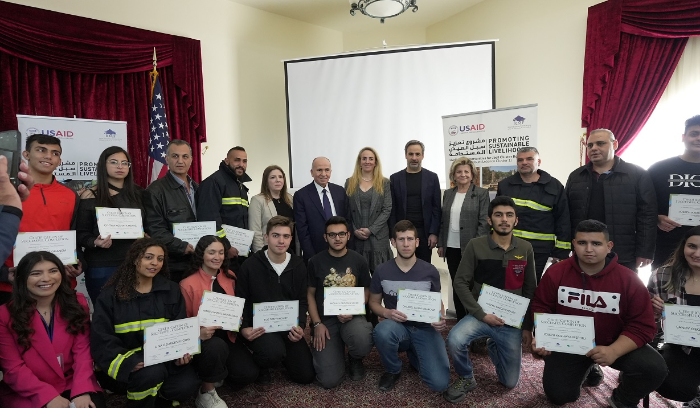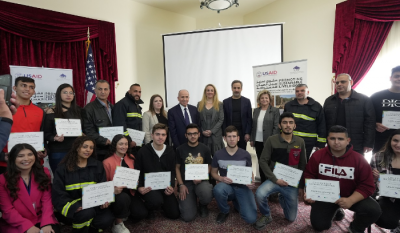The U.S. Agency for International Development (USAID) celebrated the launch of two initial response teams for firefighting in high-risk areas of Jbeil district, including Ehmej, Kortedan, and 16 neighboring villages.
The agency stated in a press release that it has trained and equipped two initial response teams comprising 31 youth volunteers from the villages of Kortedan, Ehmej, the Bentaal Nature Reserve, and the Maronite Scouts, aiming to reduce the risks of wildfire outbreaks and contribute to sustainable forest management, as Lebanon has witnessed more than 45 wildfires since 2016.
The event was attended by Amy McQuaid, the acting director of USAID in Lebanon, Michel Mouawad, the executive director of the Rene Moawad Foundation, Fadi Martinos, the head of the Jbeil Municipal Union and the Mayor of Kortedan, Dr. Pierre Khoury, the Mayor of Ehmej, local deputies, mayors, representatives from the Bentaal Reserve, Maronite Scouts, civil defense, and other community figures.
She noted, "Between March and December 2022, response teams were trained for immediate intervention and response to wildfires and to limit their spread until the civil defense arrives. Fifty trained community members cleaned pathways to enable access to 10 hectares of Kortedan forests. The project provided short-term job opportunities for over 200 individuals and their families, as part of a program to enhance sustainable livelihoods implemented by the Rene Moawad Foundation in partnership with the Forests and Development Association."
In his speech, Mouawad emphasized the importance of the project as it contributes to preserving forest resources. He stated, "We consider that forests and green spaces are not for burning, and trees are not for cutting. They can be the foundation for building our sustainable local economies, rural tourism, and development in the regions."
He added, "The second pillar of the project is that it relies on local authorities for development while managing risks. This is a firm bet of the Rene Moawad Foundation that administrative decentralization and local authorities are essential partners for development."
In McQuaid's remarks, she said, "This initiative is designed to respond to the increasing threat of fires in the Jbeil forest areas, while creating short-term job opportunities and enhancing the livelihoods of communities benefiting from forests. Today, through this initiative, 31 seasonal individuals are working in the wildfire risk management units within the Jbeil Municipal Union and Ehmej municipality. The team members have been well-trained and equipped to mitigate wildfire risks. Additionally, another 50 individuals have been hired to assist this work with the fire management unit by clearing brush and creating firebreaks."
Martinos thanked USAID and the Rene Moawad Foundation for their support, emphasizing that "the project not only supported local community members with their essential needs but also contributed to safer management of nature in Lebanon."
The agency clarified that the Sustainable Livelihood Enhancement Program (PSL) is valued at $10 million and is implemented by a coalition of eight organizations, led by the Rene Moawad Foundation, the Lebanese Maronite Order, the Maronite Foundation for Global Outreach, the Michel Daher Foundation for Social Development, the Rural Delicacies Cooperative, the Forests and Development Association, NoGarlicNoOnions, and Keylime. The program aims to improve the livelihoods of 126,000 residents in 105 municipalities across Lebanon, enabling about 2,500 individuals to develop income-generating activities and create or sustain 1,500 jobs.




